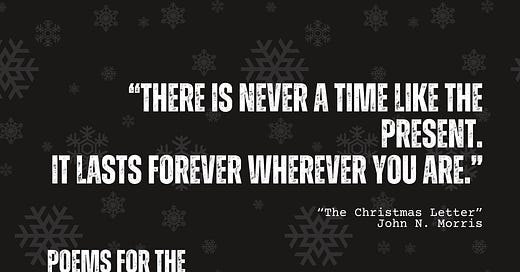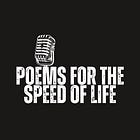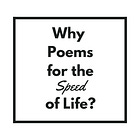S4, E3: "The Christmas Letter" by John N. Morris
The third episode of the new series of Poems for the Speed of Life, on the theme of Christmas.
Welcome to another episode of Poems for the Speed of Life with Shane Breslin, entrepreneur, writer and poetry advocate.
This is the third episode of a new series of the podcast, poems on the theme of Christmas. Today’s poem is "The Christmas Letter" by John N. Morris.
If you’d like to read along while you listen, you can find "The Christmas Letter" by John N. Morris
Commentary on "The Christmas Letter" by John N. Morris
John N. Morris, who came from Gloucester Massachusetts, was professor of English for 30 years at Washington University in Saint Louis. He went on to become a renowned researcher of ageing and was Director Emeritus at the Institute for Aging Research at Hebrew SeniorLife in Boston. He died in 1997.
“The Christmas Letter” is a tiny poem that works, I think, on several levels. First of all, at the surface level, it’s really funny, isn’t it? I mean, this letter is a bit absurd, a bit ludicrous. It’s just three sentences, just 84 words, that has taken me just about 60 seconds to read aloud, twice!
Everything is general. There is no identified writer of this letter. There is no identified recipient. The places, and the dead, and the children, all are nameless.
And yet, that lack of specificity, that total nameless generality, is a big part of what makes this for everyone!
You are the recipient. And you are sender. And you are the children. And in time, of course, you will also be the dead who aren’t going to get better.
The entire thing, three short sentences, 84 words, less than a minute to read, contains within it something vital, something essential for us all.
It is a reminder that everything moves on, even when “we are still ourselves in the same place”, it acknowledges that of course we can never just be still ourselves in the same place. We will change, just as sure as everything will change around us.
And finally — and there is the most powerful message, I think, sitting in the middle of that final short stanza — “There is never a time like the present. It lasts forever wherever you are.”
Which calls to mind something I heard once from the American author and neuroscientist and meditation leader Sam Harris and which stuck with me, possibly forever.
Now is all we have. Everything else. The past, the future, all of that exists only in our minds, in our memories and in our imaginations and in the stories we tell about what happened and what might happen yet.
Now is all we have. Whoever we are, wherever we are.
And where we are now, and especially who is around us now, that might be most important of all.
Our children, the loved ones who are with us, how the memories of dead loved ones manifests and comes back to life in our demeanour and behaviours and actions now, that is what matters, and it might be our noblest duty to acknowledge that forever now, and make the best of it.
Thank you again for listening to Poems for the Speed of Life.
I’ll be back soon with another poem in this series, the Christmas series, where I am trying to introduce you the listener, wherever you are in the world, to some of the writers who have masterly managed to capture things that are almost impossible to capture, the feelings of goodness and peace and love that this time of year brings to our families and our friendships and our hearts and our minds.
See you next time on Poems for the Speed of Life.
The Christmas Series
This is a poem from the Christmas poems series of Poems for the Speed of Life.
I know there are listeners and followers of this podcast all over the world. I know that there are many people here with many different religions, and many different faiths — or none — and I know that Christianity is just one.
If a series about Christmas leaves you in any way cold or distant, let me say that the goal of this series of the podcast is not to evangelize about Christianity, nor to show the benefits of one way of being or thinking or believing at the expense of all the others.
What it is, though, is my attempt to create something that captures something of the goodness of this time of year.
Because when I think of Christmas, and when I put aside all the dogmas of us-versus-them religion, and when I put aside the mass consumerism of the so-called “shopping season”, and when I really think of this time of year, of these few weeks each December, what I think, and what I feel, is captured in one or two words.
Goodness. Love.
When you’re about on the streets at this time of year — and yes, I’m probably talking about Europe, or the Americas, or the other places that might be part of so-called “Western Civilization” or the “Western Hemisphere” — there is something always good in the air. It is something that contains magic.
It is communal. It is generous. It is kind.
It is goodness.
It is love.
And maybe — for who am I to have any certainty about what is and what isn’t? — maybe it is God’s love, maybe it is the love of Christ, that comes to us and through us at this time of year.
Whatever it is, it is a love and a goodness that never — not in my experience anyway — comes fully through the giving or receiving of gifts, but arrives in the space between. In a quiet moment. In the look in a loved one’s eye or some fleeting moment on the street or at work, when something passes unsaid, something that remains unsaid because we might not have the words to say it, but is still somehow completely understood.
And so, this series of the podcast will include poems, and some other pieces of writing, that touch on this. Poems and passages of writing that actually do find the words that capture some of that wonder and magic. Some of that invisible spirit.
Some of that goodness. And some of that love.
Long-time listeners will know that I sometimes broaden my definition of what a poem is to include in Poems for the Speed of Life.
Sometimes I offer song lyrics, as in “The Best Day of My Life” by Tom Odell in Episode 30, “The West Coast of Clare” by Andy Irvine in Episode 45, and “The Living Years” by Mike Rutherford, in Episode 2 of the recent Fatherhood poems series.
I will do that again in this series, with a song written by an Irishman who said he has written dozens of — in his words — “dreadful maudlin songs”, but that this one came to him from somewhere else, some other place, some unseen but always present source of creativity.
Sometimes I offer sections of prose that, to me, carry all the power of poetry, like “Desiderata” by Max Ehrmann in Episode 165 and a passage from Vaclav Havel’s “Hope” in Episode 187.
In this series I will include, again, the long prose poem by Dylan Thomas titled “A Child’s Christmas in Wales” and the series will also feature a segment from “A Christmas Carol” by Charles Dickens, which, no matter how good and how memorable all the various movie adaptations might be, stands above them all as a peerless work of writing. I aim to read both Dickens and Thomas every December in any case, and here I will read them for you.
I will read a newspaper editorial published in the 1890s, and I will also, of course, read poems — by an English poet laureate, by a late great Irish poet, by several Americans, dead and alive, and by others, from elsewhere around the world.
This series is for everyone.
It’s for everyone who might want or need to feel some of this goodness and some of this love, especially in our world which sometimes seems like it’s in short supply of both.
It will be for everyone who wants to give generously, and not just in material or monetary ways, but in the generosity of spirit and consciousness and goodwill that will always be useful, and cherished, by the people you come into contact with.
I look forward to bringing you the new series of Poems for the Speed of Life, on Christmas, starting with Episode 1, on Saturday, November 23rd and continuing through December 2024.
Thank you for listening. If you’re not already subscribing or following, please do so, for free, in your podcast app or in Spotify. Keep an eye on your podcasts feeds, and you’ll be hearing from me again very soon.
See you soon.
For a detailed outline of the mission and purpose behind this podcast, please check out these two episodes:
If you’re on social media, you can follow on Instagram here and Facebook here.
You can subscribe to or follow the show for free wherever you listen to podcasts.
To leave the show a review:
On Spotify. Open the Spotify app (iOS or Android), find the show and tap to rate five-stars.
On Apple. Open your Apple Podcasts app, find the show and tap to rate five-stars.
On Podchaser. Open the Podchaser website, find the show and tap to rate five-stars.









